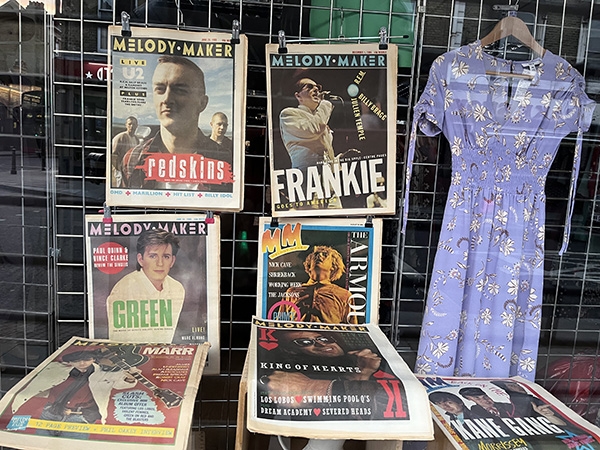| Columns Retired Columns & Blogs |
This article put a big grin on my face. I had to explain to my wife what I was chuckling at. From one dinosaur to another - thank you :) (And you are completely right about the NME vs. MM)

The Redskins produced one rather fine album, which attempted to marry left-wing politics with northern soul. Frankie was seen as outrageous in its day; "Relax" was banned on several radio shows, and some record shops refused to stock it. Now both appeared proudly in the window of a second-hand shop that raises money for the Royal Society for the Prevention of Cruelty to Animals.
Intrigued, I went in to find out what the story was. I was in luck: The person responsible for the display was working behind the counter. It wasn't, as I had assumed, a middle-aged bloke reliving his youth, reminiscing about a time when he had a full head of hair (that was me), but a young woman, probably born 20 years after those Melody Makers were published. Hoping my interest in a window display didn't make me seem too strange, I asked if she had read the articles; I might just as well have asked if she'd read the AngloSaxon Chronicle. She was further puzzled by my urgent need to inform her that I had been more of an NME man myself; it must have sounded like "enema man." Separated in age and culture by decades, we were speaking different languages. I quickly explained that I was referring to the magazine New Musical Express.
The encounter reminded me of something a friend had told me: Today, some publishers describe thrillers set in the 1980s as historical crime fiction. Lordy, the era of synth pop is now Jane Austen territory!
The assistant told me she had put the magazines in the window because she had watched I am a Cliché, the documentary on Poly Styrene. A new generation now saw Poly as an inspiration because of her independence, originality, and creative spirit. The assistant had learned that Poly advertised in Melody Maker to find band members for X-Ray Spex. Up went the Melody Maker display.
Somehow, this fact made me feel like less of a dinosaur: Those magazines weren't up there as a source of ironic postmodern humor but because they were relevant again in 2023.
It's a familiar story: A favorite band or artist has some time in the sun, enjoying the zeitgeist, then fades from view only to resurface years later. Sometimes the catalyst for the resurgence is a vinyl reissue, one of those fifth, 10th, 15th—even 50th anniversary deluxe reissues, which can consequently act as a useful (if expensive) diary to your life. Vinyl records can pretty much trace the aging process. I bought my first albums in my teens for £2 then sold them off years later for 50p each.
Some Stereophile readers will be horrified at this sacrilege, but in those days, most vinyl had the thickness of a butterfly wing without the quality. As I grew older, I went through—ahem—several relationships hence several changes of residence. The hassle of carting boxes of records around grew wearisome; CDs were so much lighter, and often, they sounded better. But then technology improved, albums got remastered, and I'm now in a happy, stable relationship, so the vinyl's back! Now, I'm gradually repurchasing my whole collection ... for £30 each. Here's hoping I won't need to resell them again.
There's a cheaper alternative to buying reissues new: Many middle-aged and older folks spend their days hunting vinyl at car-boot sales and—yes—charity shops. Twitter is full of boastful posts of the day's successes. I never have such luck, finding mainly Razorlight and Maroon 5 albums.

When I was 16, The Damned were on constant repeat, but for 30-odd years I haven't given them much thought—until recently, when I lent an ear to their latest album, Darkadelic (footnote 1), which blew me away. I think it's the best thing they've ever done. I went to see them live. They were marvelous. Of course, they're no spring chickens: Captain Sensible's first words after coming on stage were "The good news is that we're still alive!" The audience was a wide mix of ages. It is perhaps ironic that seeing The Damned play made me feel young again.
Maybe all this reconnecting with the past via music is nothing more than nostalgia, for those of a certain age with more disposable income than we had back then. Even if our musical horizons expand (and not everyone's do), those first records—the ones we loved and bought when we were young (even if some we sold off later)—were our first sunsets. They remain the brightest and loveliest. "Get It On" ("Bang a Gong" in the US) and "Starman" were the first songs to light up my future possibilities. Later, I loved many a maligned 1980s LP.
That decade seems to be enjoying a resurgence. A further example, one with more profound cultural relevance than some charity-shop display, is last year's international success of "Running Up That Hill," Kate Bush's 1985 single, which was due to its prominence in the Netflix series Stranger Things. (Set in the 1980s, apparently an example of historical science fiction.) When you've lived through these historical backdrops, they can make you feel old—or you can revel in the times you enjoyed with the music and how they are now part of you.
Leaving the shop, I looked again at the display and smiled. Those Melody Makers were there to draw people in to raise money for animal welfare, but the musicians featured did a whole lot for the well-being of this old dog.